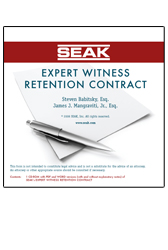How to Draft an Expert Witness Retainer Agreement That Prevents Most Problems Experts Face
By Steven Babitsky, Esq., and James J. Mangraviti, Jr., Esq. © 2011 SEAK, Inc.
SEAK’s Highly Acclaimed Expert Witness Retention Agreement – In Use By Over 2,000 Experts – Download Today.
Executive Summary
The authors serve as consultants who assist expert witnesses. Each and every week expert witnesses contact us to help solve problems that arise in their practices. The inescapable fact is that 90% or more of the problems we are presented with could have been prevented, solved, or mitigated by a well-drafted expert witness contract.
Problems That Can Be Solved by Bullet-Proofing Your Retention Agreement
Problem #1: Getting purposefully conflicted out of the case. Attorneys will “retain” you without committing to paying you anything and without asking you to bill any time on the case. The purpose is to lock you up and prevent you from working for the other side. Solution: Clause specifying non-refundable retainer.
Problem #2: Not getting paid. Solutions: Clauses specifying that you must be paid in full before reports are issued or testimony is given. Additional clauses allowing for interest and attorneys’ fees; stating that retaining counsel is responsible for paying your deposition fees (this also protects against your deposition fee being reduced by the court as unreasonable); stating that the contract is made with the law firm, not the attorney or the client; stating that you can withdraw if not paid.
Problem #3: Incomplete documentation. Solution: Clause requiring the attorney to provide all relevant non-privileged documents.
Problem #4: Adverse Daubert challenge you are unaware of and that ends your career. Solution: Clause requiring you be notified of Daubert and similar admissibility challenges.
Problem #5: Not being properly prepared. Solution: Clause that allows you to withdraw if not prepared by the retaining attorney.
Problem #6: Conflicts of interest. Solution: Clause requiring you to be notified of parties and lawyers and allowing your withdrawal if there is a conflict of interest.
Problem #7: Storage costs. Solution: Clause specifying that files will be destroyed 30 days after the engagement ends.
Problem #8: Not knowing when a case settles. Solution: Clause requiring notification from counsel upon final disposition of case.
Problem #9: Unethical attorney. Solution: Clause allowing you to withdraw if the attorney breaches ethics rules.
Problem #10: Interrogatories prepared without consulting you (such that you may not agree with them). Solution: Clause requiring your advance approval of interrogatories.
Problem #11: Not given enough time or resources. Solution: Clause allowing you to not offer an opinion if you are not provided with adequate time or resources.
Problem #12: Last-minute cancellations. Solution: Clauses specifying cancellation fees for last-minute cancellations.
Problem #13: Being taken advantage of on travel matters (for example, flying Southwest and making 3 connections to save money). Solution: Clause specifying direct flights where available.
Problem #14: Scheduling conflicts. Solution: Clauses specifying when you are unavailable and requiring certain notices for deposition and trial testimony.
Problem #15: Stuck working for a sleazy or incompetent successor law firm. Solution: Clause specifying you are under no duty to work for a successor firm.
Conclusion
The key to dealing with most of the problems expert witnesses face is to prevent them before they occur. A well-drafted expert witness retention agreement covering the above items is your best defense against such problems.
There are three ways to obtain such an agreement. First, an expert can use the above list as a starting point and draft his own agreement. Second, an expert can hire an attorney on an hourly basis to draft an agreement. Finally, experts who would like a peer-reviewed, widely accepted agreement used successfully by over 1,000 experts should consider SEAK’s Expert Witness Retention Contract.
Keep in mind that whatever agreement you use should never be presented as “take it or leave it” to a prospective client. Experts should consider making reasonably requested modifications. Also keep in mind that a fair and balanced retention agreement can serve as a very effective early warning system. A lawyer who flat out refuses to sign such an agreement may not be one you want to work with.
About the Authors
Steven Babitsky, Esq., and James J. Mangraviti, Jr., Esq., are the creators of SEAK Inc.’s Expert Witness Retention Contract. Both are former litigators who have trained thousands of expert witnesses. They are the co-leaders of the annual National Expert Witness Seminar and have co-authored numerous texts on expert witnessing including How to Market Your Expert Witness Practice, The A-Z Guide to Expert Witnessing, Cross-Examination: The Comprehensive Guide for Experts, National Guide to Expert Witness Fees and Billing Procedures, Depositions: The Comprehensive Guide for Expert Witnesses, Writing and Defending Your Expert Report: The Step-by-Step Guide with Models, How to Become a Dangerous Expert Witness: Advanced Techniques and Strategies, and The Biggest Mistakes Expert Witnesses Make: And How to Avoid Them. They have also co-produced several educational DVDs for expert witnesses. Steve and Jim currently serve as principals of SEAK, Inc., a national continuing education firm specializing in training, consulting, and services for expert witnesses of all specialties. For more information, please visit www.testifyingtraining.com.

